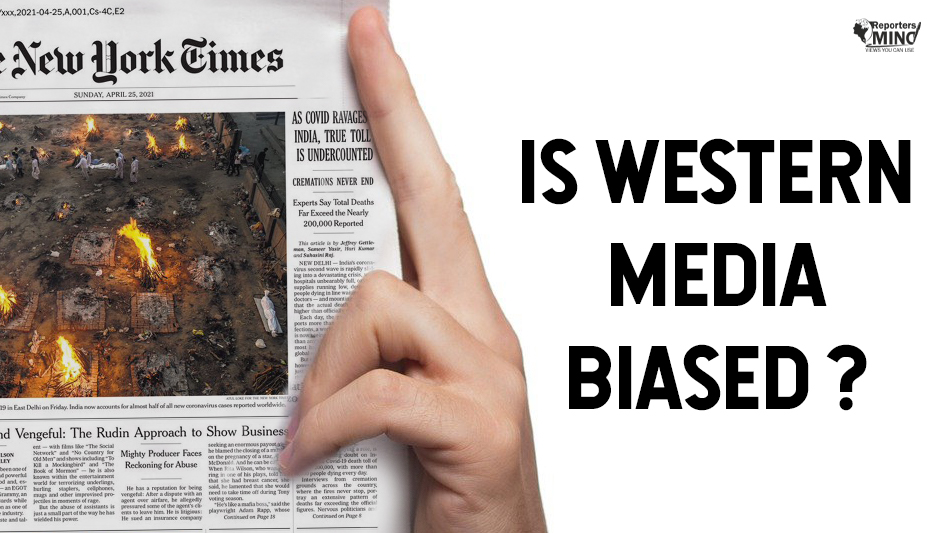
Is Western media biased in reporting India’s second Covid wave?
India’s battle with the second Covid wave, which has resulted in one of the biggest human tragedy of our times exposing lack of preparedness and mismanagement by the government, has received flak from all quarters including International press.
The fourth estate— media— has a right to question the functioning of government in a democratic set-up. Hence press criticism of this ‘mismanagement’ is natural, however, what raises question is Western media’s approach in reporting India’s current Covid situation.
Is Western media biased or only fulfilling its duty?
If we go by what and how Indian media projected and highlighted Covid-related tragedies in the West, particularly, the USA, Italy, France, Germany, Spain, United Kingdom, Brazil among others then it only seems natural that the Western media is fulfilling its duty by reporting facts based on ground reality.
Rama Lakshmi, an eminent journalist who spent 27 years as India correspondent for The Washington Post, in her recent piece in ‘The Print’ rejects the ‘bias claim’. “Who in India showed a photograph of a corpse’s foot sticking out of the sheet, another of grave diggers, body bags being U-hauled, a morgue full of bodies wrapped in plastic bags and even refrigerator truck used to store. Have we forgotten the video showing mass burials at Hard Island, New York? Certainly, these were not by any standards coverage American government would have liked,” she questioned.
While emphasizing that pictures do the talking, she says unnecessarily conspiracy theory going around that the American papers do not cover death and tragedy the same way they are covering Indian Covid fatalities.
Some of the descriptions like ‘A tsunami. Disastrous public health outcome. Stunningly reckless decisions Preventable deaths. Covid hell. A moment of reckoning. Out of touch approach.,’ did bring India to a disrepute at international arena but can we deny it?
The government surely would not have anticipated the magnitude of the devastation the second wave caused with ‘double’ and ‘triple mutant’ across the country but it did not prepare itself as it assumed ‘all is over’ after first wave last year.
“How long we can say ‘Ghar ki baat ghar mein rehne do’ since the villain in the room this time isn’t Pakistan, JNU, or urban Naxal?” Rama asked and said, ‘there is no denying the fact that it is the usage of photographs of funeral fires, shot up-close or aerially, that has enraged some in the Indian commentariat’. The charges range from Orientalism to the Western desire to see India fail by choosing to focus on ‘bhooka-nanga’ tragedies, Rama said.
‘Most of the reports, analysis and, especially, editorials on India’s Covid situation, which have appeared in the foreign media bluntly blame Prime Minster Modi for fueling the crisis and failing to manage it’, says Shambhavi Thakur, another top journalist in News Laundary, who also questioned the handling of the second wave of pandemic and contended that the Western media backed up their arguments and analysis with facts, generally gleaned from the ground.
Meanwhile, Arati Jerath, an eminent political commentator, opined that while Indian prime ministers have been criticized by international media in the past, the current coverage was unusual in how personal it was. “It started by talking about mismanagement, bad administration, and the mistakes that PM Modi made. But now, they’re commenting on his personality flaws and that is very unusual,” she said. “Attributing the mismanagement to certain flaws in his personality is a lot like the way the Western media used to criticize Donald Trump”, she further adds.
Jerath attributed much of the negative press to the prime minister’s boasts earlier this year, about defeating Covid and being the world’s pharmacy.
“The government has brought all this criticism on its head with its behavior, the boastful comments, the way they are trying to take on the world,” she said.
Happymon Jacob, who teaches international relations at Jawaharlal Nehru University, Delhi felt the coverage is not unprecedented, as international media have always covered India extensively. “India is too important to fail, too important to ignore. What happens here has an impact on the international system. Besides positive and negative coverage are two sides of the same coin therefore it will be reported,” he said in a recent interview.
“The West and the media looked at PM Modi as the man who was going to transform India. But over the last seven years, the western media is closely watching India and now, with the biggest mistake of all, which is not preparing for Covid and trying to shift blame, they are just calling it out,” he adds and cautions about its economic implications. “For economic engagement, the general positive mood is important. The coverage could also make a difference to how India is perceived abroad. Until now, India was a huge success story. The public perceptions are going to change,” he concludes.